Hopefully, you’ve seen my recent picture post and YouTube video about my trip to Istanbul, Turkey. It was an absolute blast — I found it incredibly beautiful and inspiring, in so many ways. One source of inspiration was of course all the amazing food! It is so easy to eat healthy there, and in this post I’m going to explain many of the dishes and individual foods I ate while there, along with why applying Beauty Detox principles to Turkish cuisine is both delicious and beautifying. Though part of Turkey/Istanbul is in Europe and part is in Asia/the Middle East, there are some crossovers with Turkish cuisine into Middle Eastern cuisine, so I wanted to broaden this post into tips for Turkish and Middle Eastern restaurants in general. I have to warn you though, this post is going to make you want to go out and get many of these ingredients, perhaps even take a trip to Istanbul yourself! I can say that after this recent trip of mine, I wholeheartedly recommend visiting this fascinating and mystical country if you ever get the chance. Let’s get started…
Here Are the Beauty Foods I Ate Most
What follows is a partial list of the foods I ate liberally while on my trip to Istanbul. For each individual food, I’ll explain how it’s typically eaten in the country/cuisine, why it’s so nutritious, and how the nutrition elements of each food can help with both health and beauty.
Eggplant
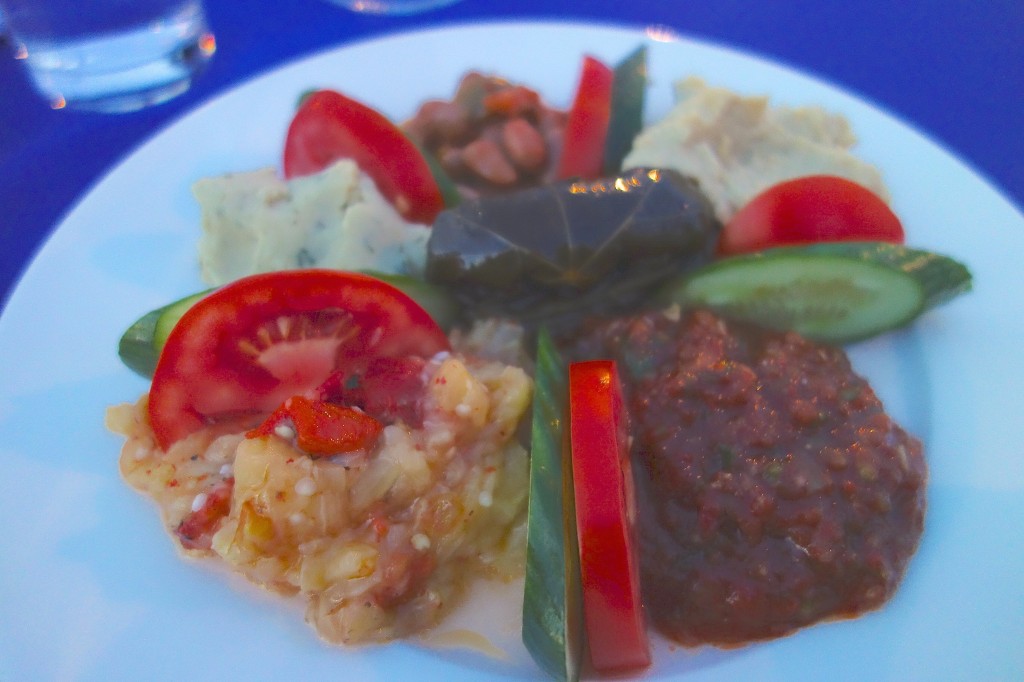
Cucumber
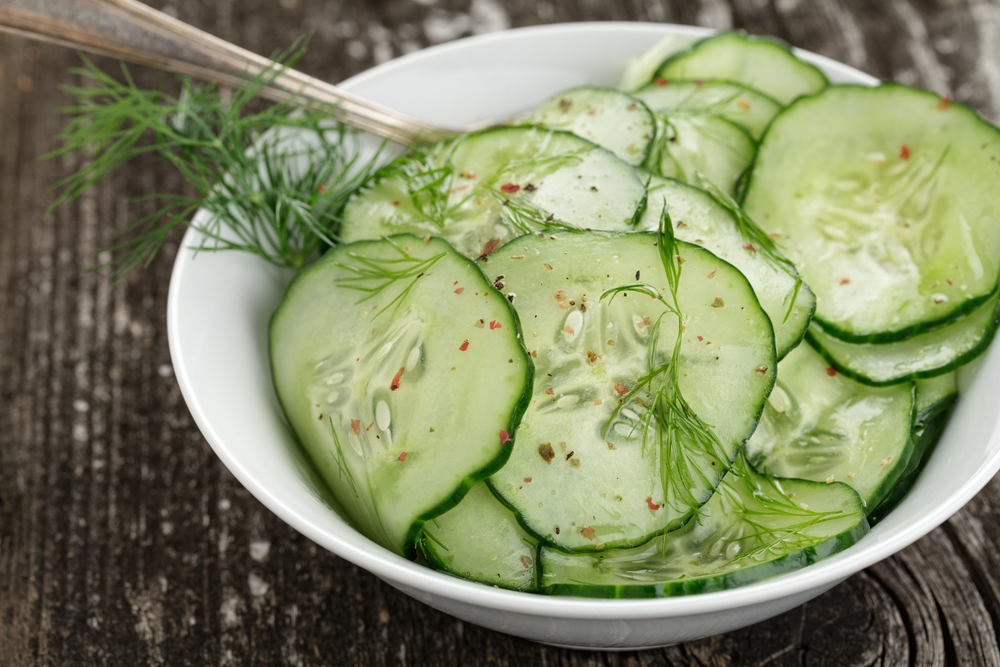
Tomato
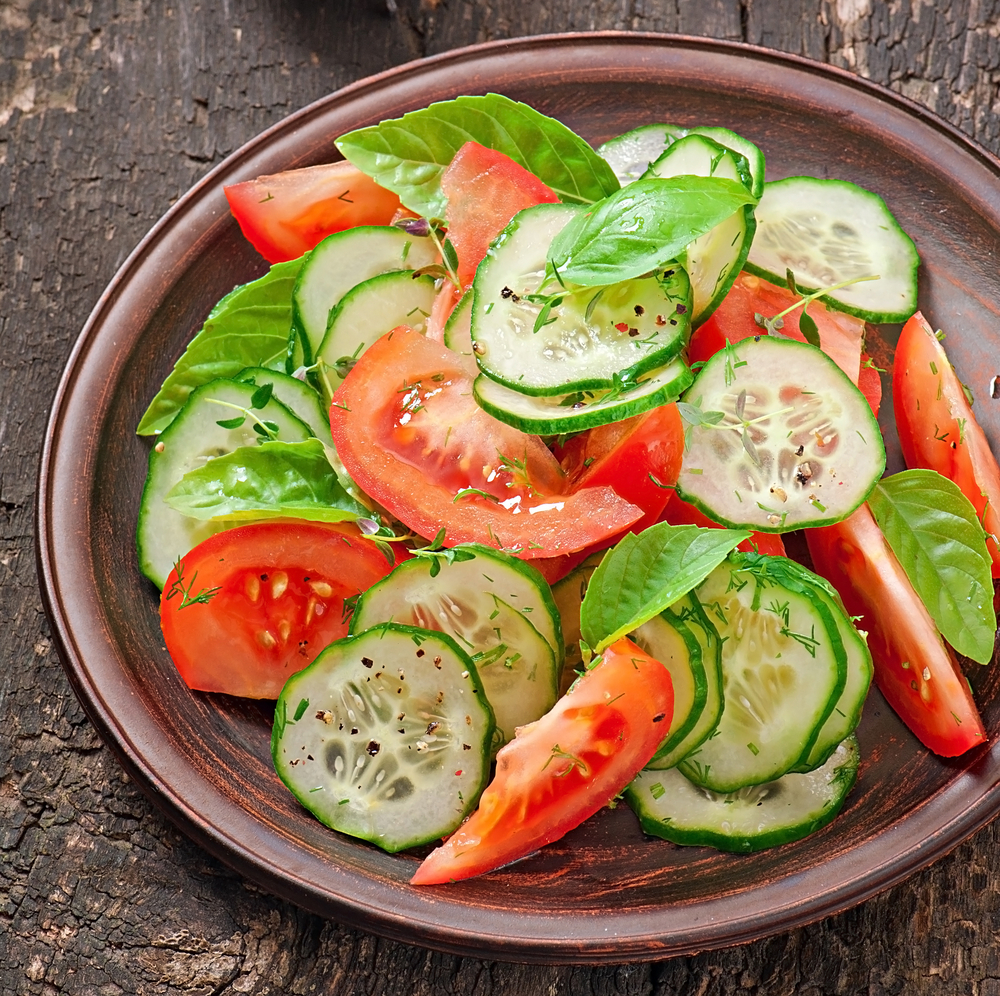
Lemon
Were you to go to Turkey, you might not find it immediately obvious that lemon is so popular. But then you eat there for a few days, and you realize it’s in so many dishes — from the salads, to the dips (like hummus), to many of the main courses — lemon is a very frequently used ingredient. They even have lemon tea, which many people there consume daily. Now, I’ve already written about lemons extensively in The Beauty Detox Foods — and here is a direct quote about the benefits of lemons:
Lemon aids with digestion by increasing the secretion of bile from the liver, while also acting as a strengthening agent for the liver’s enzymes. Any support to the liver, which is our primary detoxifying organ, is going to help clear up acne in the long run. Lemon is high in vitamin C, which is water-soluble and travels easily through your body, destroying free radicals and toxins. Lemon acts as a blood purifier and as a cleansing agent to flush out bacteria and toxins in the body. These properties, which aid digestion, also make it helpful in long-term weight loss.
Peppers
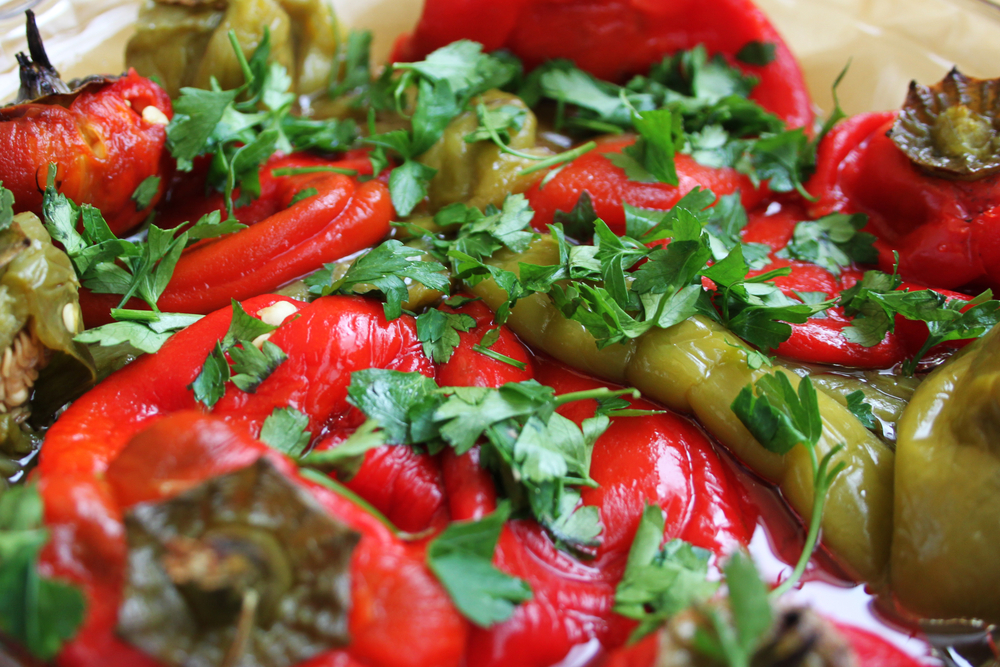
Hummus (Chickpea)
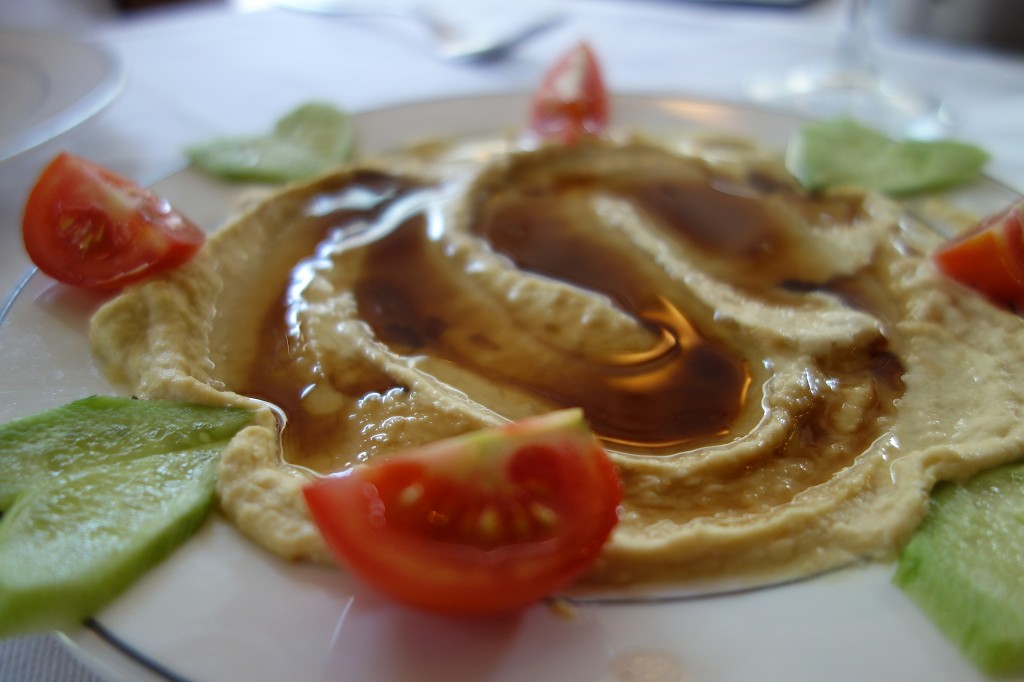
Mushrooms
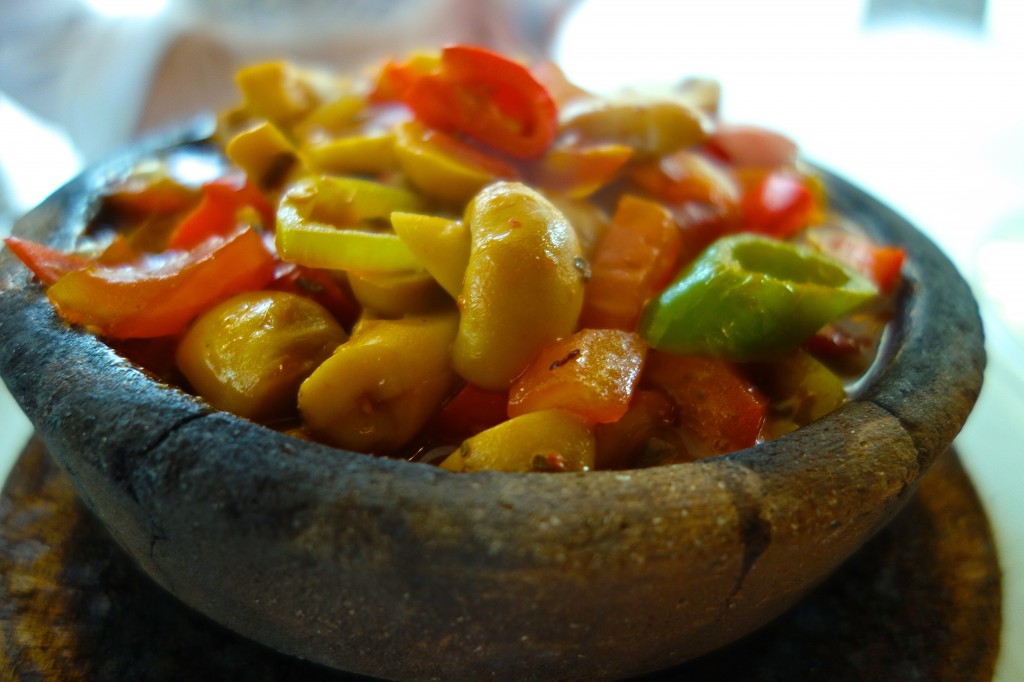
Parsley

Olives
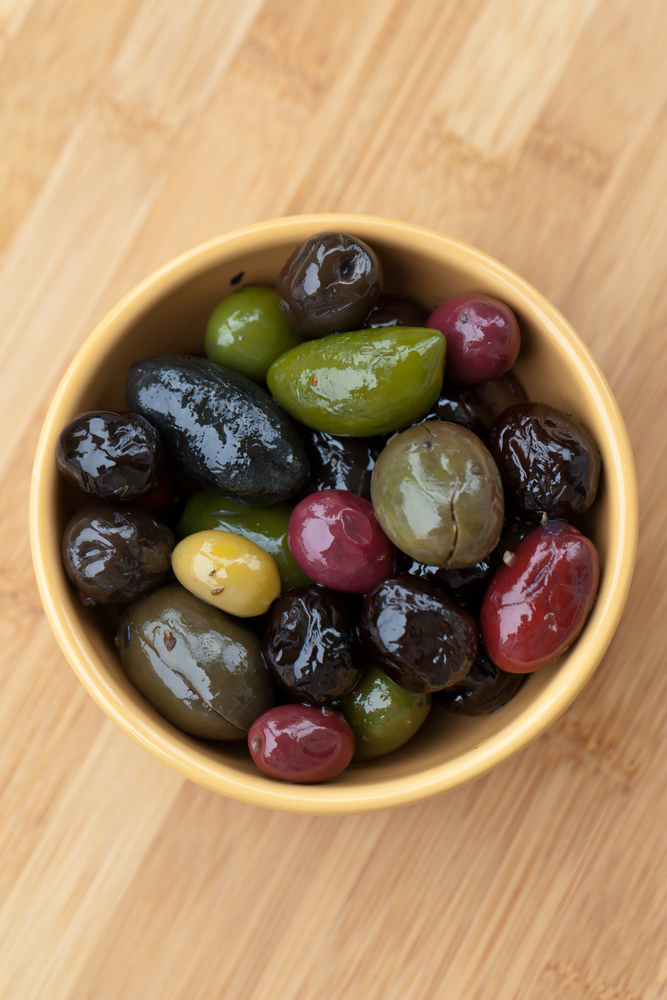
Fresh/Dried Fruit
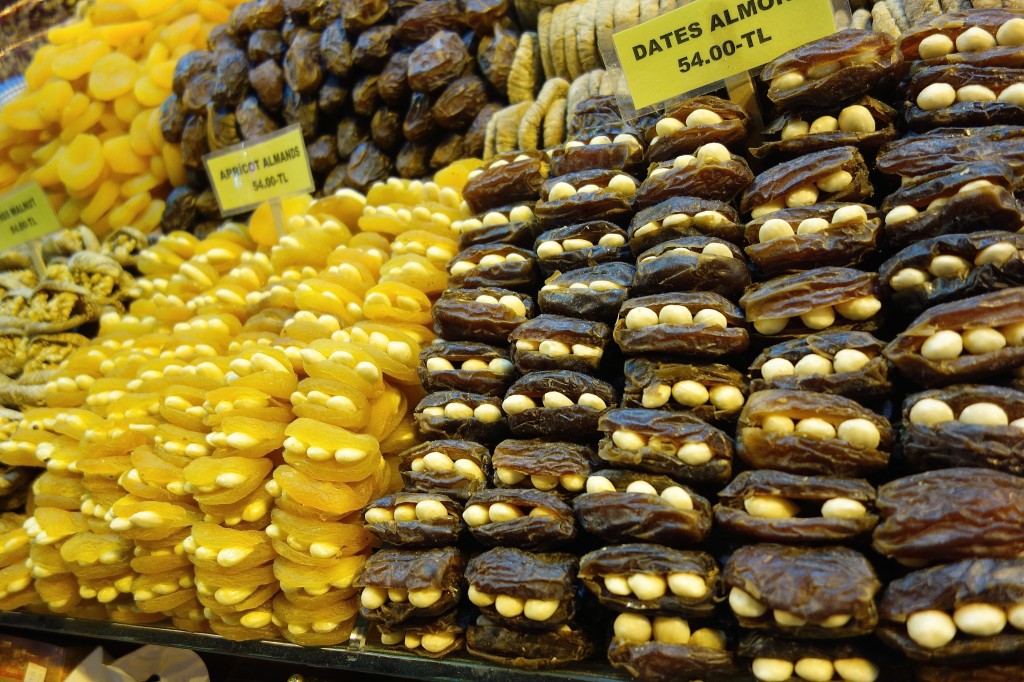
Nuts
You’ll often find many nuts available in Turkey, which can be eaten as a snack, or even included in certain dishes. The most common ones I saw there were pistachios, walnuts, and almonds. While the high fat content of nuts means they should be consumed moderately, they are an extremely rich source of the skin-beautifying antioxidant vitamin E, the major antioxidant in human epidermal tissue, which creates smoothness and suppleness. For vegans, nuts are also an excellent source of protein and amino acids, making them very “building” foods. Just be careful not to overdo them!
Foods I Avoided in Turkey
Below are the three main types of foods I avoided while in Turkey (which I avoid pretty much anywhere I go). As we’ve seen throughout this post, there are so many options, it was super easy to work around them while still enjoying so much of the country’s yummy cuisine.
Bread
Unfortunately, bread makes up a very regular part of the diet. They often bake bread twice a day (so at least it’s fresh!), and there is often some form of bread at lunch or dinner. Because I do my best to avoid gluten, I opted not to go with the bread at meals and instead used vegetables to dip into the humus. While common, bread isn’t really necessary to enjoy the cuisine to its fullest — you can have plenty of variety and pleasure without it.
Yogurt/Dairy
Often there will be little dips or sauces with yogurt as a base and dill or cucumber or other veggies used to add additional flavor. Cheese is also part of certain dishes and meals, though many meals there are completely dairy-free. Given that I consider dairy to be one of the more aging foods out there, I avoided it completely and never had to really think about it finding its way into any of my meals.
Meat
While the diet in Turkey is not all that heavy in meat, most tend to incorporate at least a little meat in lunch and/or dinner. Some of the stews and main dishes are meat-based, and one of the most popular ways to consume meat there is on a kebab. Fortunately, the good news is that you can just as easily request a vegetable kebab, which often contains peppers, onion, mushrooms and zucchini — or make one at home. Roasted veggies on a kebab along with salad and a hearty soup or dip is an amazingly filling, beatifying meal.
Desserts
There are a LOT of beautiful-looking pastries in Turkey! Unfortunately, as you would expect, they are not beautifying. They contain gluten, lots of sugar, dairy products and lots of oils/butter. Thankfully, to quell a sweet tooth there are delicious dried dates pretty much everywhere.
The Health Benefits of Eating Turkish/Middle Eastern Cuisine—The Beauty Detox Way!
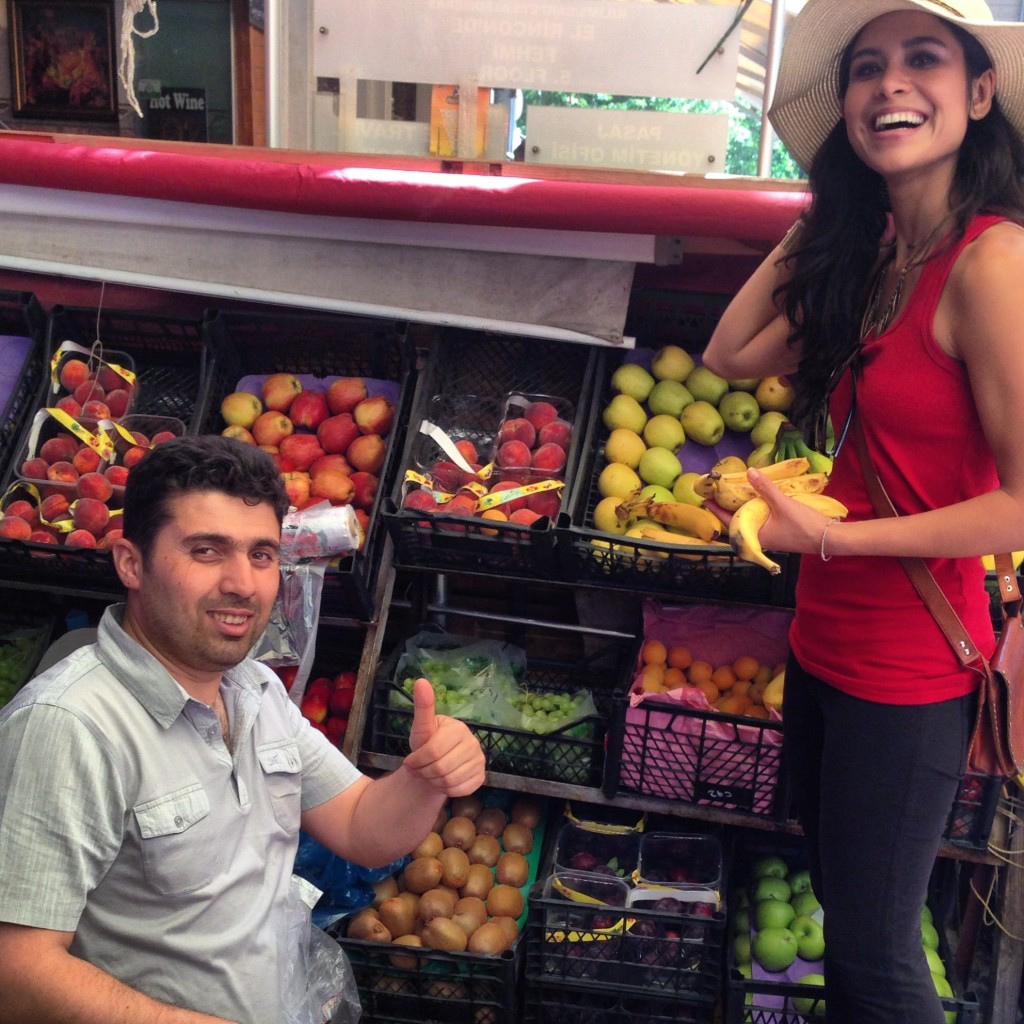
- You eat so many different veggies throughout the day. As you’ve seen, we named nearly a dozen plant foods. And that represents only a tiny fraction of the many different foods we ate while on our trip. Remember, an abundance of plant foods bring energy and enzymes that can powerfully aid digestion. They also deliver many beneficial nutrients that contribute to your body’s overall vibrancy. This would also be considered a high alkaline diet, which preserves cellular health.
- You only eat unsaturated fats. Saturated fats from animal sources, especially if from a poor source, can clog up your system, leading to heart disease and high LDL (bad) cholesterol levels. Most of the fat in Turkish cuisine comes from olive oil, nuts and seeds — all of which are unsaturated fats (specifically, they are monounsaturated fat — or omega-9 — which can be helpful in reducing cholesterol, and decreasing the risk of certain cancers. There are also some omega-3 sources, like walnuts, in this cuisine.
- You cut down or eliminate the animal protein and dairy. Both of these foods create a state of metabolic acidity in your body. Since your body needs to maintain an alkaline pH to function properly (and to look your most beautiful), when you eat metabolically acidic foods like animal protein and dairy, your body pulls alkaline mineral salts from your bones and cells to neutralize the acids and return to alkalinity. This hampers cellular rejuvenation. Likewise, dairy contains a protein, casein, and a sugar, lactose, that the human body does not process well. This can create increase toxicity within the body. Further, animal proteins and dairy are one of the highest sources of toxins for humans to ingest, including antibiotics, hormones, and pesticides.
- You get tons of antioxidants every day. We’ve covered many of the antioxidants present in these plant foods — from the major ones like vitamin A, C and E — to the more specialized ones that protect your brain, organs and more. Eating Beauty Detox-friendly foods, prepared with the flavors and textures of Turkish cuisine, is one of the surest ways to get a full spectrum of powerful antioxidants into your diet.
- You cut out all the processed food! Part of the reason today’s Western diet is so unhealthy is due to the highly processed foods commonly consumed. These foods contain toxic chemicals, pesticides, artificial flavors, food dyes, sugar, and neurotoxins like MSG. Eating a minimally processed diet like the one found in Turkey, especially when combined with Beauty Detox principles, can help protect you against the many diseases associated with processed foods.
- You eat very little or NO refined sugar or artificial sweeteners. Sugar consumption causes spikes in blood glucose, which result in the release of insulin. Excessive sugar consumption in the Western diet causes overuse of the pancreas, which may result in insulin overproduction. It may also stop producing it altogether as the production mechanism wears out. Sugar also feeds Candida albicans, the yeast found in the human body. Proliferation of Candida albicans can cause a whole host of health problems, including weight gain and difficulty losing weight. By eating this way, you automatically lower your sugar consumption far beyond what most individuals eat, setting you up for fantastic progress in your health and wellness. Note: There may be a little sugar added to the sauces of certain dishes, but if you avoid the desserts you’ll consume a very small amount of sugar, comparatively.
- You get an abundance of fiber. You’ve seen all the fruit, vegetables, legumes, nuts and other plant foods we’ve discussed in this post — fiber is everywhere in Turkish cuisine. And that’s great news for your body, because fiber helps promote colon health, keeping your bowel free of toxins. Fiber intake is associated with lowered risk of certain cancers, heart disease, and stroke. Lastly, fiber can help you feel full faster, can absorb fat consumed in your diet, and can ultimately help you shed weight.
Here’s a Sample Day of Beauty Detox Eating—with a Turkish/Middle Eastern Twist!
- Upon Rising – water with lemon upon rising; lemon tea if you prefer something hot.
- Morning– Have your Glowing Green Smoothie or a GGSo with some of the veggies we’ve covered in this post, including cucumber, parsley, and apple. If no candida issues, you can also have a serving of fruit, perhaps choosing some of the varieties that are popular in Turkey, including apricots, peaches, melons or figs.
- Lunch – Mixed vegetable salad with romaine lettuce, olives, tomatoes and cucumbers. Humus dip with cut veggies. If you make the GGSo, garnishing it with finely cut tomatoes and cucumbers will give it a little bit of Turkish flair!
- Snack – If hungry in the afternoon, have more GGSo or even some veggie sticks and a few nuts, to give you some energy and keep you going.
- Dinner – Tomato, cucumber and parsley appetizer salad + baked casserole filled with mushrooms, eggplant, tomato sauce, onion, garlic and more.
This is just a overview of what your menu might look like eating this way — I don’t have exact recipes for these items yet. But I tried something the other day and I am going to work on it and present it here soon… Please let me know in the comments section if you’d like to see that!
Hope This Was Helpful!
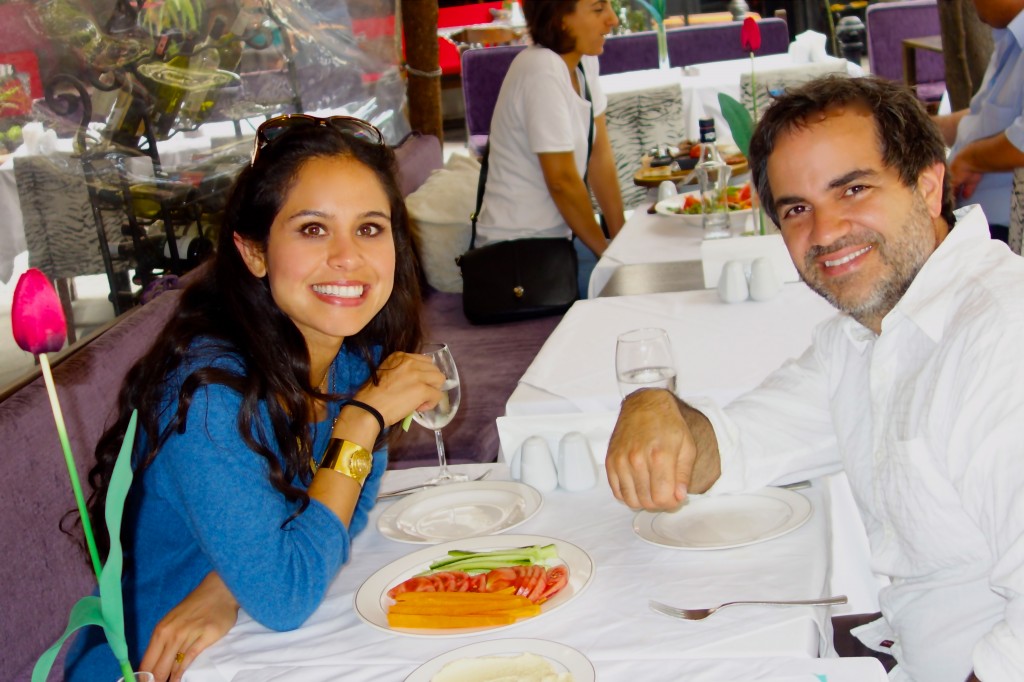


Live in Tel Aviv, love this! I recently gave a talk at work about easy beginning steps to eating and living well (a request from coworkers and they now all have the link to this blog!) Several of my coworkers have told me what a difference lemon water in the morning has made for them. Got some of them and even their kids on chia now too! Only took 20 minutes. Thanks for all you do
I leave for Istanbul on July 1st for a few months. Your posts couldn’t have come at a better time!
I have been loving your travel posts and what to eat in every country. I especially appreciated your posts in Italy, since I am allergic to both gluten and dairy!
But one thing that keeps coming up in my mind about your menu plans is how low calorie they all are. I have asked before if I am just “missing” something in your beauty detox book, but right in this post, I see what it would look like for a day’s worth of food, and it can’t add up to more than 900-1100 calories at the most.
Am I wrong in this?
Thanks for the suggestions. I just ate at a Turkish place last weekend and now understand the mistakes I made. I’m excited to go back and see if I can order better next time. Preparing for my trip to Istanbul next year :).
I’d like to know what GGSo stands for? What’s the o? Also I’ve been unable to located the low calorie GGS recipe on the site or in the modules. Any chance someone can tell me where to find it?
So glad to be on this journey, almost 2 months now and down 13 lbs.
I loved reading your blog about Turkey. I would love for you to follow my Fb page and wordpress.
My parents are from Turkey and I blog out family recipes. Wonderful experience you had, thanks for sharing it with us.
http://www.mediterraneanmealsformoms.com
http://www.helenadourian.wordpress
Extremely helpful Kimberley. Thank you
You’re welcome Marie!
Everything is so fresh, healthy and delicious in Turkey. The olives are to die for.
For some reason hummus taste different over there, even comparing to home made hummus. It might be the garbanzo type.
Very cool post.
Thanks Claudia, totally agree!
Hi Kim, I absolutely love Middle east cuisine, I was in Beirut twice and the food is to die for. I would really like the recipe for the mushroom casserole. Also I was so sad as I traveled from Chicago to Glow Bio to hopefully find u there and I found out that you will be out of the country for the next couple of months was so sad! but next trip you should go to Lithuania :)
Thanks Sandra, and sorry I missed you. Next time! :)
Kim,I love reading you blog so much,I will care about you